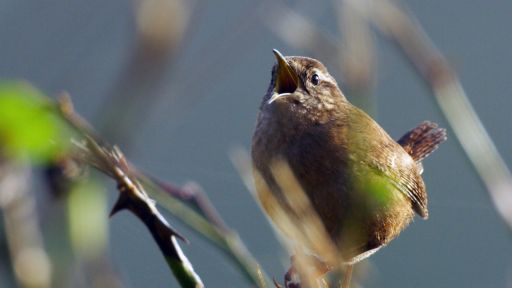The lyrebird can mimic the sounds of at least 20 different species. A male lyrebird manipulatively uses this to his advantage, mimicking the sound of a flock of birds to convince a nearby female that danger is outside of his realm and that she is better off sticking with him.
Features



- [David Attenborough] Few have analyzed the grand finale of the male lyrebird's song more intensively than Dr. Anastasia Dalziell.
She and her team were the first ones to film it properly.
- We thought, no one's gonna believe us until we've actually filmed it.
It's really not like anything else that has been described previously in birds or any other animals.
(birds chirp) - [Narrator] It is by studying the recordings from their remote camera that the team were able to understand the real secret of the male lyrebird's song.
And it's this footage, together with our own, that enables us to show this remarkable behavior on television for the first time.
Having sung A, B, and C and been rejected, the male now begins song D.
- So this final song, it's a sound of a flock of small birds, (bird chirps) mobbing, reacting to a stationary or a hidden predator, like a snake.
And this was totally bizarre.
- [Narrator] So why is he imitating a flock of birds?
Well, a predator means danger.
So at the sound of an alarm call, the female freezes.
The forest is no longer a safe place.
Now the male takes advantage of her panic.
He jumps on top of her to mate.
It's hard for us to see her under his feathers and it's hard for her to see out from under them.
He's doing everything he can to disorientate and confuse her.
- The male is actually telling her a big fib.
'Don't leave me because out there there's a hidden predator that you haven't seen.'
To put it another way it's like saying, 'Baby, it's dangerous outside.
Come back here with me where it's nice and safe.'
- [Narrator] The lyrebird is in fact a bird that tells lies.
His song is an acoustic illusion.
Up to now, scientists have thought that song was an honest signal from the male but it seems song can also be manipulative and false.
